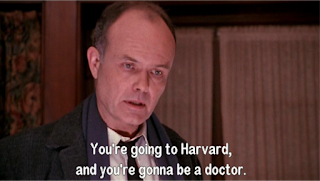As we'll discuss, grandparents are identified to offer a variety of supports and resources for grandchildren. And their relationships run along a continuum from remote/ritualistic to involved to companionate to custodial. Increasingly in our US society grandparents raise their grandchildren - for a period of time, for the duration of the child's life, through living in extended family households (such as the teenage mother and her child who live with her parents). For many children, grandparents are also 'cultural conservators,' maintaining the norms, customs and values of our heritages.
Please share a bit about your own relationships with your grandparents. All of them (depending how many) or maybe a single grandparent who was/is meaningful to you. How would you describe your relationship? What does the grandparent do for you and support your development? What do you do for the grandparent and how do you support him or her?
 This
is my characterization of one of my grandparents. My grandfather (Earle
"Grandpa" Powers, 1898-1984) was my mother's father (pictured to the right with my grandmother - Alice). He and my
grandmother lived in Toledo, Ohio while my family lived in a Chicago suburb or east coast cities. That meant
that contacts were occasional (Christmas and summer) but consistent
while I was growing up. And in my adulthood I put effort into visiting
them. I only knew my grandfather in his retirement so he was a symbol of
adulthood of someone who pursued hobbies rather than the demands of work. He sang,
went to the Masons, smoked cigars, painted, read and traveled. I loved
knowing an adult who had so many interests. He gave me someone to love
being with and look forward to visiting when the majority of adults in
my childhood were those I had to be responsible to. And who were stressed. Or boring. Or both. We weren't close enough (relationally or proximally) or my identity formed enough for me to perceive differences that would affect my sense of connection to him. He also gave me history to my mother's side of
the family; a dimension of her that as a child I didn't understand or
tangibly see. In turn I wasn't
someone he needed to be responsible for (his active parenting focused on
my mother and uncle). And I believe that he liked the attention and affection and I know that I was a source of pride for him. It probably also helped that I resemble my mother, so his felt connection to family was obvious every time we were together.
This
is my characterization of one of my grandparents. My grandfather (Earle
"Grandpa" Powers, 1898-1984) was my mother's father (pictured to the right with my grandmother - Alice). He and my
grandmother lived in Toledo, Ohio while my family lived in a Chicago suburb or east coast cities. That meant
that contacts were occasional (Christmas and summer) but consistent
while I was growing up. And in my adulthood I put effort into visiting
them. I only knew my grandfather in his retirement so he was a symbol of
adulthood of someone who pursued hobbies rather than the demands of work. He sang,
went to the Masons, smoked cigars, painted, read and traveled. I loved
knowing an adult who had so many interests. He gave me someone to love
being with and look forward to visiting when the majority of adults in
my childhood were those I had to be responsible to. And who were stressed. Or boring. Or both. We weren't close enough (relationally or proximally) or my identity formed enough for me to perceive differences that would affect my sense of connection to him. He also gave me history to my mother's side of
the family; a dimension of her that as a child I didn't understand or
tangibly see. In turn I wasn't
someone he needed to be responsible for (his active parenting focused on
my mother and uncle). And I believe that he liked the attention and affection and I know that I was a source of pride for him. It probably also helped that I resemble my mother, so his felt connection to family was obvious every time we were together. So, my relationship with my grandfather on our continuum was companionate. And he gave me a role model, a sense of connection to the past and a wider, larger sense of 'family,' and the emotional support of someone I felt comfortable with and someone else who had value for me.
What are your connections to grandparents?










